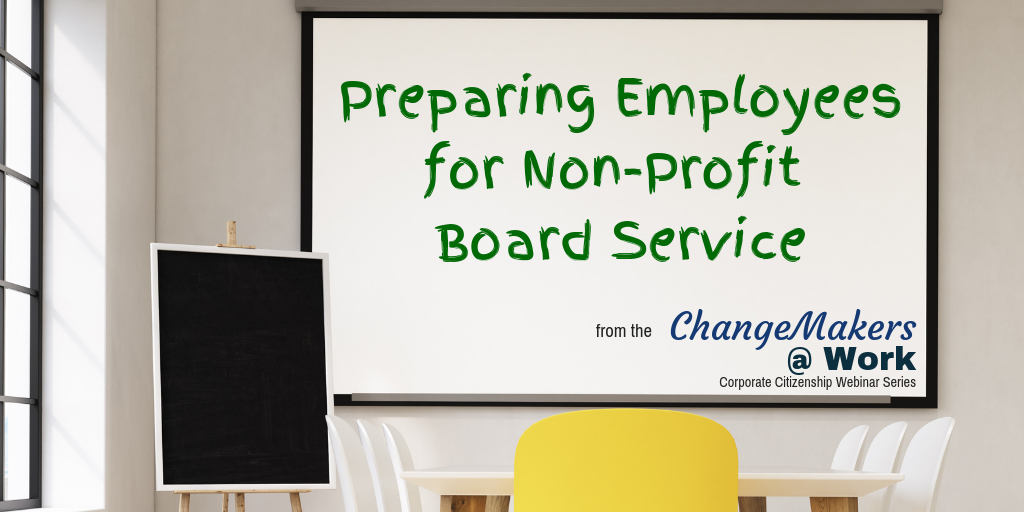
If you work in Corporate Social Responsibility, odds are you are often the one in your company that gets approached by employees and executives for information on finding a Board position. Non-profit Board service is a wonderful leadership opportunity, building and sharing skills and perspective, while allowing individuals to support a cause they care about in their community. How can you, as a CSR practitioner, support employees who are interested in serving on a Non-profit Board? Where can they find Board training and resources in their community?
That was the topic of our recent ChangeMakers@Work Webinar, where we heard from Moira Taylor, Executive-in-Residence at Capacity Canada and Joanna Lohrenz, Vice President Customer Experience, Manulife Canada who shared their knowledge and experience. Here’s an overview of what they had to say.
The responsibilities of a non-profit Board
Just as in any organization, a non-profit Board is responsible for guiding the organization towards its mission. Where profits and shareholder interests may guide the Board at a company, the organization’s mission is the guiding light of a non-profit. Taking on a Board role is a commitment to those that the organization serves; it should be taken seriously and done with consideration.
But, what does a Board member actually do? There is a wide range of responsibilities and they must be fulfilled with the best interests of the organization in mind.
- Provide the organization with strategic direction
- Monitor the performance of the organization and the Executive Director/CEO
- Provide financial and risk oversight
- Manage the governance system and Board processes
- Delegate operations to Executive Director/CEO
- Master the distinction between operations and governance
Fiduciary Duty : A legal obligation of one party to act in the best interest of another.
Business Dictionary
Boards have a fiduciary responsibility in three areas: Duty of Care; Duty of Loyalty; and Duty of Obedience. These include acting honestly; placing organization’s interests first; knowing and obeying the laws.
On the more technical aspects of the role, Board members must:
- Understand the budget, capital, and investment status of the organization
- Provide oversight of insurance and audit
- Provide performance reporting and monitoring
- Develop governance policies

So, what makes a good Board member? A good Board member…
- Asks questions
- Acts in the best interest of the organization
- Keeps current on relevant issues
- Attends meetings regularly and comes prepared
- Asks questions
- Participates and makes a significant contribution
- Uses good judgement in decision-making
- Understands decisions can only be made as a group
- Understands that the Board speaks with One Voice
- Asks questions
Finding the right fit
When helping an employee to find a Board placement, start by asking them what they are passionate about and what they are not interested in. Other key questions for employees should consider before joining a non-profit Board:
- Are you passionate about the cause of the non-profit?
- What is the reputation of the non-profit?
- Are you attracted to a well-run, high-functioning organization, or, would you prefer to work with an organization in crisis?
Some first steps for the employee should include:
- Reviewing the non-profit’s website
- Reviewing the most recent annual reports and audited statements
- Considering the current Board membership
- Taking a look at organization’s charitable listing on the CRA website (if the organization is a registered charity)
Once they have done their initial look at the organization, one way to better understand a prospective Board and to see if it is a good fit, is to have a conversation with a current Board member. Here are some key questions to ask before joining a Board:

- What time commitment is involved in being on the Board?
- How frequently does the Board meet?
- What is the length of terms of office?
- Are Board members expected to fundraise for the organization?
- What outstanding crises or liabilities does the Board have?
- Do Board members have access to ongoing Board governance training?
- Does the organization have a strategic plan, and when was it last updated?
If there is no open Board position at an organization they are interested in, joining a committee of the Board is a great way to get an introduction to the organization, the Board, and its work. It’s also a great way for the organization and the Board to get to know them.
Board Training and Resources
There are many ways to connect employee volunteers to training and resources to assist in finding a rewarding Board service opportunity include:
- Board matching organizations like Capacity Canada, B3 and onBoard Canada
- Workshops at local volunteer centres in cities and regions across Canada
- Board training resources like the 20 Questions series from Chartered Professional Accountants Canada
As a CSR practitioner, you can play a key role in engaging and preparing employees for fulfilling non-profit Board service experiences that match their skills and interests with the needs of a non-profit organization. Board service is a rewarding way to make a positive impact in your community, grow as a person and as a professional.
For more Corporate Citizenship resources, click here.
For information on upcoming webinars in the ChangeMakers@Work series or to register, click here.
